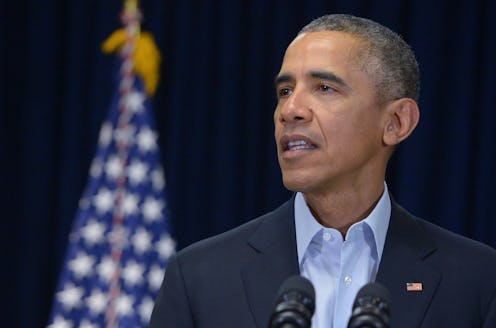News
Why The Next Justice Will Be Chosen By Obama
The shock of Supreme Court Justice Antonin Scalia's death had hardly registered before the Republican Party began to barrel full speed ahead down a dangerous and unfortunately familiar path of obstructionism. Throwing historical precedents and the U.S. Constitution's Appointment Clause out the window, Republicans came out fiercely opposed to the idea that President Barack Obama would name a new Supreme Court justice. But with 11 months left between now and the next president's inauguration day, Senate Republicans' decision to continue gambling on a strategy of obstruction politics could result in disastrous repercussions against the party. Any decision to block Obama's nomination could hurt Republicans come November.
Senate Majority Leader Mitch McConnell was joined by Republican presidential candidates Ted Cruz, Marco Rubio, and Ben Carson (not to mention a host of other conservative lawmakers within the GOP) in arguing the party owed it to the people of America to keep Obama from being able to name Scalia's replacement. "The American people should have a voice in the selection of their next Supreme Court Justice," McConnell said in a statement. "Therefore, this vacancy should not be filled until we have a new President."
Republicans have consciously employed a strategy of obstruction for more than a decade, and it hasn't always worked to their favor. In Congress, the party reportedly hoped that "in obstructing the Senate from doing its job, it would further lower Congress’s generic favorability rating among the American people," former Republican Congressional staffer Mike Lofgren revealed in 2011. Lofgren claimed the idea was that "by sabotaging the reputation of an institution of government, the party that is programmatically against government would come out the relative winner." Unsurprisingly, the belief was not shared by Democrats.
Even with Obama's "lame-duck" status, Senate Republicans' decision to block the president from appointing a Supreme Court judge would defy historical precedent regarding the average amount of time it has taken for the Senate to vote on a nomination. According to data compiled by the New York Times, the average time between a the announcement of a nominee and their confirmation, rejection or withdrawal is 25 days. Furthermore, it's never taken more than 125 days to hold a vote on a Supreme Court appointment.
With 340 days left in Obama's presidency, Senate Republicans are going to find themselves employing some pretty aggressive spin tactics while the Democratic presidential candidates look to capitalize on the latest example of Republican obstruction in the presidential election
It's unclear whether Republicans are truly blissfully unaware of how weary the majority of voters are with their obstructionism and partisan war cries or just plain stupid. Certainly it can be argued the party may not have thoroughly thought out the pros and cons of once again declaring it won't play with Obama when it comes to Scalia's replacement during an election year. Even so, the seeds have now been planted and whatever battle breaks out between the Republican-led Senate and the White House is guaranteed to factor into the decision voters make when they cast their ballots nine months from now. Republicans' decision to leave the country without a full Supreme Court for nearly a year could see the presidential election fall neatly into Democrat's hands.
